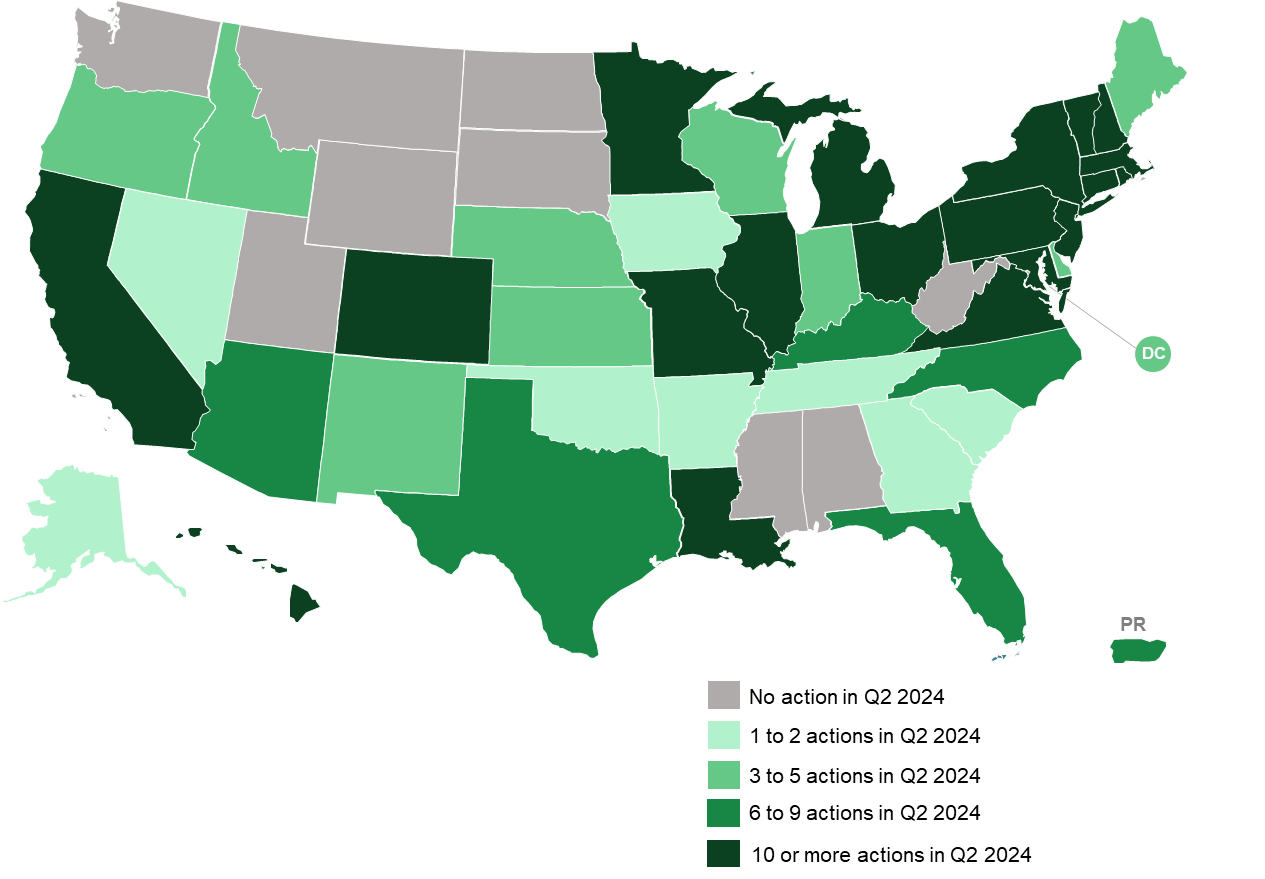The 50 States of Electric Vehicles: Utilities Focus on Active Managed Charging Programs During Q2 2024
Raleigh, NC – (August 7, 2024) The N.C. Clean Energy Technology Center (NCCETC) released its Q2 2024 edition of The 50 States of Electric Vehicles. The quarterly series provides insights on state regulatory and legislative discussions and actions on electric vehicles and charging infrastructure.
The report finds that 41 states, plus the District of Columbia and Puerto Rico took actions related to electric vehicles and charging infrastructure during Q2 2024 (see figure below), with the greatest number of actions relating to rebate and grant programs; registration or charging fees for electric vehicles; state procurement of electric vehicles; charging infrastructure planning activities; and rules governing publicly available charging stations. States also continued to take actions planning for National Electric Vehicle Infrastructure (NEVI) program funding distribution.
A total of 561 electric vehicle actions were taken during Q2 2024, with the most active states being Massachusetts, New York, California, Illinois, New Jersey, Minnesota, Michigan, and Hawaii. So far in 2024, 29 states have enacted legislation related to transportation electrification, as of early August 2024.
Q2 2024 State and Utility Action on Electric Vehicles

The report discusses three trends in electric vehicle actions taken in Q2 2024: (1) new states adopting electric vehicle registration fees, while per-kWh charging fees gain in popularity, (2) utilities focusing on development of active managed charging programs, and (3) a growing number of utilities filing comprehensive transportation electrification plans.
“Utilities have increasingly been promoting managed charging programs for residential customers,” noted David Sarkisian, Principal Policy Analyst at NCCETC. “These programs can be either passive (offering incentives for off-peak charging) or active (offering incentives for allowing direct utility control of EV charging).”
The report notes five of the top policy developments of the quarter:
- The Governor of Virginia exiting participation in California’s Advanced Clean Cars Standards;
- Xcel Energy submitting its Transportation Electrification Plan in New Mexico and receiving a decision on its Colorado plan;
- NV Energy filing a Transportation Electrification Plan with Nevada regulators;
- Vermont lawmakers enacting a wide-ranging transportation program bill; and
- The South Carolina Public Service Commission releasing a report on transportation electrification challenges and opportunities.
“As the adoption of electric vehicles continues to grow, so too does the EV focused utility offerings, with an increased focus on active managed charging programs,” observed Emily Apadula, Policy Analyst at NCCETC. “These programs allow the utility to directly control a customer’s charging load in order to remotely optimize charging times and reduce stress on the grid. This quarter alone, utilities in twelve states considered managed charging programs.”
View the 50 States of Electric Vehicles Q2 2024 Quarterly Report Executive Summary
View and Purchase the 50 States of Electric Vehicles Q2 2024 Quarterly Report
View other 50 States Reports – Solar, Grid Modernization, Electric Vehicles and Decarbonization
ABOUT THE NC CLEAN ENERGY TECHNOLOGY CENTER
The NC Clean Energy Technology Center, as part of the College of Engineering at North Carolina State University, advances a sustainable energy economy by educating, demonstrating and providing support for clean energy technologies, practices and policies. It serves as a resource for innovative, sustainable energy technologies through technology demonstration, technical assistance, outreach and training. For more information about the Center, visit: http://www.nccleantech.
Media Contact: Shannon Helm, shannon_helm@ncsu.edu